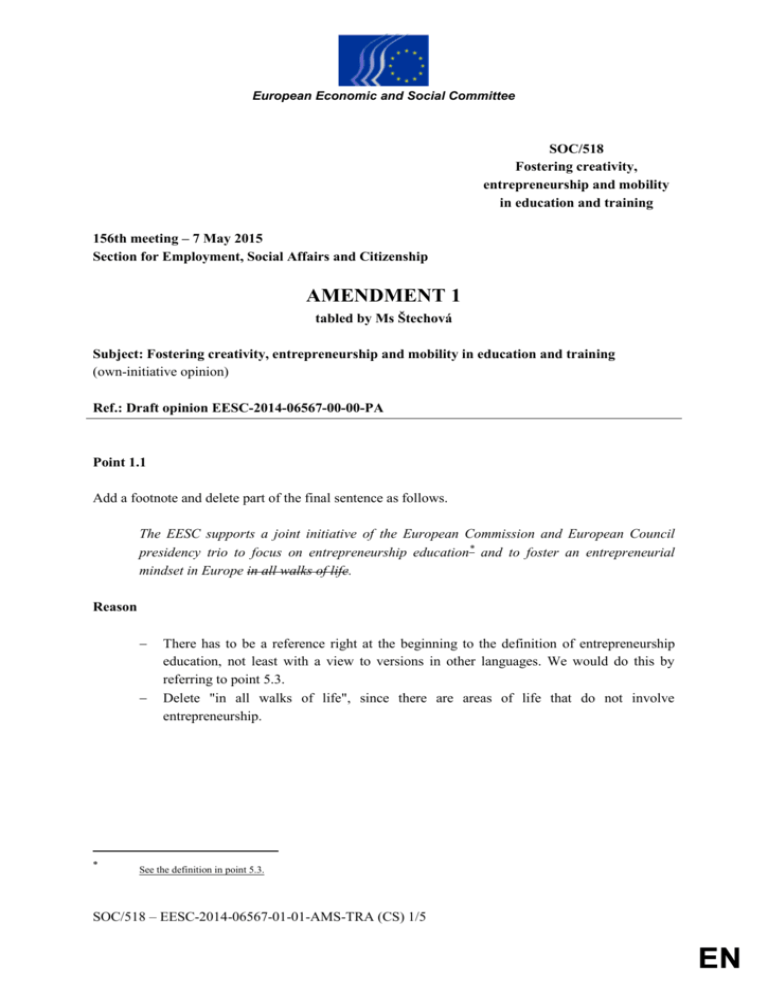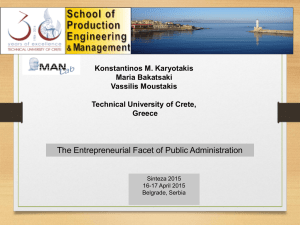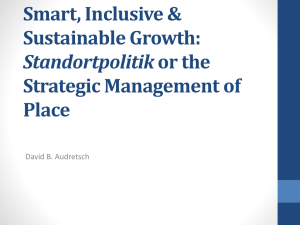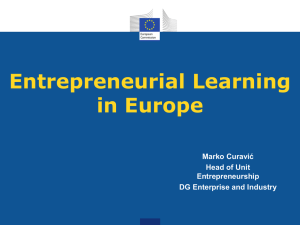Fostering creativity, entrepreneurship and mobility in
advertisement

European Economic and Social Committee SOC/518 Fostering creativity, entrepreneurship and mobility in education and training 156th meeting – 7 May 2015 Section for Employment, Social Affairs and Citizenship AMENDMENT 1 tabled by Ms Štechová Subject: Fostering creativity, entrepreneurship and mobility in education and training (own-initiative opinion) Ref.: Draft opinion EESC-2014-06567-00-00-PA Point 1.1 Add a footnote and delete part of the final sentence as follows. The EESC supports a joint initiative of the European Commission and European Council presidency trio to focus on entrepreneurship education* and to foster an entrepreneurial mindset in Europe in all walks of life. Reason * There has to be a reference right at the beginning to the definition of entrepreneurship education, not least with a view to versions in other languages. We would do this by referring to point 5.3. Delete "in all walks of life", since there are areas of life that do not involve entrepreneurship. See the definition in point 5.3. SOC/518 – EESC-2014-06567-01-01-AMS-TRA (CS) 1/5 EN Point 1.4 Amend as follows: The EESC calls for gradual development of transversal key competences as defined in the EP and Council recommendation (2006)† with the aim of contributing to better adaptability, employability, social inclusion and mobility. Reason To make the message clearer. More realistic wording in the light of the situation. Point 1.7 Expand as follows: Entrepreneurship education needs to be considered, however, in the context of the overall social – and not just business – environment. Entrepreneurship skills should be appropriately addressed at all levels of education and training, starting from an early age, in a manner that enables their continuous development across the curriculum. Reason Education to help people take up any role in society depends on the state of society as a whole and not just one if its sectors – i.e., business. Frequent crises, unfavourable demographic developments, changes in the nature of society and so on can mean that the importance of entrepreneurship education will also change. This is the reason for the changes in the wording. Point 2.3 Amend as follows: The Council for Youth, Education, Culture and Sport stressed in its conclusions of 12 December 2014‡that both entrepreneurship and education are priorities of the Europe 2020 strategy for smart, sustainable and inclusive growth. Developing an entrepreneurial mindset can have considerable benefits for citizens in both their professional and private lives. † ‡ Recommendation of 18 December 2006, OJ L 394, 30.12.2006, p. 18. Council conclusions on entrepreneurship in education and training, 12 December 2014, OJ C 17, 10.1.2015, pp. 2–7. SOC/518 – EESC-2014-06567-01-01-AMS-TRA (CS) 2/5 Reason It is not the aim of the opinion to deal with the "entrepreneurial mindset" in private life. Indeed, the benefit to people's private lives is not clear. Point 3.3 Amend and expand as follows: The LMO conference on "Supporting start-ups to create growth and employment"§ also clearly showed that entrepreneurship education should be considered in the context of the wider social environment. The business environment should nevertheless be geared to , including facilitating businesses start-ups, cutting red tape, and addressing labour market flexicuritybility. Pre-start, start-up and development incentives can be effectively linked to a range of other active labour market policies (ALMP) and also need to be seen in the context of a wider framework of business support and enterprise development. Reason The broader context has to be given: Education to help people take up any role in society depends on the state of society as a whole and not just one if its sectors – i.e., business. Frequent crises, unfavourable demographic developments, changes in the nature of society and so on can mean that the importance of entrepreneurship education will also change. Flexicurity is a more balanced approach to developments in the labour market. Points 4 and 4.1 Change heading and amend point 4.1. as follows: 4. Transversal skills applicable in all areas of life 4.1 Entrepreneurship in eEducation and training should aim to give all learners, irrespective of their gender, socio-economic background or special needs, the opportunity to develop the skills and competences needed for entrepreneurshipto develop an entrepreneurial mindset and capacity. § 35th Meeting of the EESC Labour Market Observatory, 13 November 2014. SOC/518 – EESC-2014-06567-01-01-AMS-TRA (CS) 3/5 Reason Heading: The word "transversal" is enough in itself to indicate that numerous areas are involved; the generalisation does not correspond to reality. 4.1. To be given orally (clarification of the wording). Point 4.2 Amend as follows: In addition to basic skills such as literacy and numeracy reading, writing and arithmetic, entrepreneurship requires the gradual development of a range of transversal key competences as defined in the EP and Council recommendation from 2006, including a sense of initiative and entrepreneurship and the ability to turn ideas into action. It involves creativity, innovation and risk-taking, as well as the ability to plan and manage projects in order to achieve objectives. Reason Clarification, including with regard to other language versions, and making the reference more accurate. Point 5.1 Expand as follows: Entrepreneurial skills are important for life in general and for giving people more control of their futures. Entrepreneurship skills should be appropriately addressed at all levels of education and training, starting from an early age, in a manner that enables their continuous development across the curriculum. Reason For the sake of consistency with other amendments; will be explained more fully orally. Point 5.5 Delete as follows: Not all people are born to be businessmen or businesswomen. An entrepreneurial spirit only generates more options for them to succeed in their professionals and life. But those who have talent for doing business and the courage to turn their entrepreneurial spirit into action should be promoted. SOC/518 – EESC-2014-06567-01-01-AMS-TRA (CS) 4/5 Reason The opinion is not about people's private life. Further explanation to be given orally. Point 7.3.1 Delete as follows: Entrepreneurial teacher training institutions should develop a clear educational concept, to equip teachers with the ability to also teach for the labour market of tomorrow. Education supporting the entrepreneurial mindset needs to be integrated as a horizontal approach and a cross-curricular subject throughout the whole study programme and geared to the actual needs of the labour market. Reason Self-evident; will be further explained orally. Point 7.3.2 Delete the point. Entrepreneurial teacher training programmes should motivate student teachers to develop their own entrepreneurial knowledge, skills and attitudes. Reason The statement is too general: this requirement cannot be directed at all teachers. Point 8.1 Delete as follows: Business should be closely consulted regarding the formulation of education activities for entrepreneurship. This is necessary to ensure... [etc.] Reason Moderating the call. _____________ SOC/518 – EESC-2014-06567-01-01-AMS-TRA (CS) 5/5







